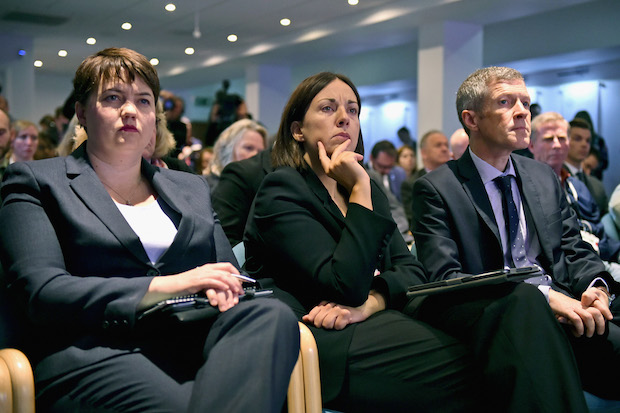This afternoon Scottish Parliament will vote on Nicola Sturgeon’s call for a second independence referendum. With MSPs expected to vote in favour of the motion, Theresa May’s line that ‘now is not the time’ for a referendum looks set to come under increased pressure. ‘IndyRef2’ could still be pushed back as far as 2020/21 but behind the scenes Unionists are beginning to make preparations for a second vote.
So, what would — and what should — a cross-party campaign look like this time around? Two years prior to the 2014 referendum, Better Together was established with the support of the three main unionist political parties in Scotland: Scottish Labour, the Scottish Conservative Party, and the Scottish Liberal Democrats. I understand that representatives from the three parties held a meeting a couple of weeks ago to moot the idea of forming a similar campaign vehicle — with the working title ‘New Direction’ — in anticipation of a second referendum.
Fraser Nelson asks Ayesha Hazarika and Paul Sinclair if the Unionists are ready for battle:
However, little agreement was reached. In echoes of the EU campaign, Scottish Labour (with some input from Labour down south) voiced concerns over joining any cross-party effort and signalled that they would prefer to run a separate Labour campaign. The general campaign could still have a representative in Alistair Darling. The Labour grandee — and former chairman of Better Together — is working behind-the-scenes to form the campaign. However, he is reluctant to act as the public face of the campaign. This presents a problem, as Ruth Davidson — the next obvious choice — faces strong opposition from Labour who are reluctant to be associated with a campaign led by a Tory. Another option being considered is to find a non-political figure to lead the campaign — but finding someone both able and non-partisan also looks a challenge (just remember Stuart Rose’s appointment as the hapless chairman of Stronger In).
As Steerpike revealed last week, Andrew Cooper — the co-founder of Populus — is in talks to get on board as the pollster. While there’s plenty of reason to doubt that Cooper is the right choice for this, on polling data there’s something that the three parties can at least agree on. Private polling suggests that Scottish voters are more ambivalent towards the EU than the SNP would have us believe. However, on the issue of the single market they hold stronger opinions — seeing it as a generally positive thing that they associate with jobs and prosperity.
This suggests that the SNP’s latest tactic of talking about the single market instead of the EU isn’t just down to a late realisation that it would be difficult for Scotland to join the EU as an independent country. Instead, a focus on the single market (when compared to a ‘cliff edge’ hard Brexit) is thought to appeal to voters more than a focus on the EU. It follows that the material effect of ‘IndyRef2’ is that it makes the prospect of leaving on WTO terms less appealing to the government (though it’s worth noting that the UK’s single market is still worth more to Scotland’s economy than the EU’s). Whatever deal the government makes in the negotiations has to be defendable to Scottish Unionists.
The challenge for any Unionist campaign — and for Theresa May in the negotiations — will be to show that access to the single market (in the place of membership) offers people enough reason to believe there will still be prosperity and security in their jobs and the economy. If they can do that, there’s plenty of hope for the union yet.







Comments